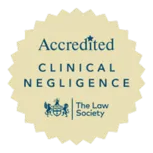What Counts as a Late Cancer Diagnosis?
As you’d expect, when cancer is diagnosed earlier, this can massively help improve the outcome and the chances of remission. However, cancer can be diagnosed late. In these cases, symptoms can go unidentified for longer than they should.
This leads to a delay in the treatment of cancer, which can lead to the cancer spreading. This can result in more invasive treatment being required and, unfortunately, a lower chance of the patient surviving.
Reasons why delays happen include:
- Failure to make a referral to a specialist
- A doctor missing or misdiagnosing early signs of cancer
- Checks or treatment being pushed back due to waiting lists or administrative errors
In the majority of cases, when cancer is spotted and treated earlier, the prognosis is likely to be better.
A delay in diagnosis may mean:
- The cancer is diagnosed when it is at a more advanced stage;
- The cancer has spread to other parts of the body;
- More aggressive treatment is required by way of surgery, chemotherapy or radiotherapy;
- Treatment may leave life changing injuries;
- There is an increased likelihood of the cancer returning;
- There is an increased likelihood of the cancer spreading;
- An impact on life expectancy.
The Duty of Care
Medical professionals have a duty of care to provide you treatment which meets a certain standard. In the UK, there are nationally recognised guidelines that each health professional should follow which are related to their specific speciality.
The guidelines from the National Institute for Health and Care Excellence (NICE) are an example of guidelines which all medical and health professionals must take account of when they’re making a clinical decision or judgement.
These set out recommendations which should be followed to recognise and appropriately refer a patient for further investigation and treatment dependent on the site of the suspected cancer.
If it can be shown that a health professional provided treatment which fell below the acceptable reasonable standard of care, which can include a failure to follow NICE or any other guidelines for their specific speciality, without a justifiable reason, they may be found to be negligent in the care that they provided to you.
Can Cancer be Misdiagnosed and how common is it?
According to Cancer Research, 1 in 2 people in the UK get diagnosed with cancer at least once in their lifetime.
Macmillan reports that though survival rates are improving, with early diagnosis giving patients the best chance of living for longer or making complete recoveries, there is still a sad statistic about cancer misdiagnosis.
But while most cancer patients have positive care experiences in the UK, cancer still often goes undiagnosed or is misdiagnosed, and a study by The Independent showed that there are four out of ten cancer patients initially misdiagnosed at least once before their disease is identified. The wrong type of, or late, treatment can decrease your chances of survival. If this is the case, you could be able to make a cancer negligence claim.
There are so many reasons as to why cancer could be diagnosed late or misdiagnosed by a medical or health professional. These include:
- Misinterpreting X-rays, scans, tissue samples or other medical results
- Missing or failing to investigate symptoms
- Referral or procedural delays
- Delays to starting your treatment
Which types of cancer are often delayed or misdiagnosed?
There are over 200 types of cancer. Many of these cancers share symptoms with other health conditions. This means a wide variety of cancers can go undetected or misdiagnosed for many months. Common cancer misdiagnosis claims involve:
- Breast cancer being mistaken for inflammatory breast conditions such as mastitis and fibrocystic breast disease
- Bowel cancer being mistaken for irritable bowel syndrome (IBS)
- Lung cancer being mistaken for lung infections such as bronchitis, tuberculosis and pneumonia
- Ovarian cancer being mistaken for any ovary related issues such as endometriosis
- Pancreatic cancer being mistaken for inflammatory bowel diseases including pancreatitis. In the UK, 3 in 5 people are diagnosed with pancreatic cancer at stage 3 and 4 of the disease developing. Unfortunately, when pancreatic cancer is diagnosed later, the treatment becomes less and less effective
- Brain Tumour being mistaken for another health problem.
Why is Early Diagnosis of Pancreatic Cancer so Important?
As mentioned above, the early diagnosis and treatment of any type of cancer – and pancreatic cancer in particular – the more likely it is that the treatment will be successful. This means your chances of living a long and healthy life are higher.
When a diagnosis is delayed, the process for accessing surgery, chemotherapy and radiotherapy is also slowed down. In the UK, 7 in 10 people with pancreatic cancer will not receive any active treatment. This is because a lot of people are diagnosed When their cancer is at a late stage, meaning treatment might not be fully effective.
In addition, misdiagnoses or late diagnoses can lead to symptoms getting worse, which in turn affects their quality of life.
In the worst cases, when a diagnosis isn’t given for cancer, or someone is misdiagnosed, their condition can manifest into diabetes, indigestion, unexplained blood clots, or other fatalities.
For some types of cancer, the difference in survival rates at detection stage is huge. If diagnosed at the earliest stage possible, more than 9 in 10 people will survive bowel cancer for five years or more. If diagnosed late, this statistic drops to just 1 in 10 people surviving the five-year mark. According to the NHS, Sadly, around 16,500 people lose their life each year to this disease, making it the second biggest cancer killer.
None of this should be the case, as bowel cancer is treatable and curable if diagnosed early.
The Consequences of Cancer Misdiagnosis
It’s essential that any type of cancer is detected and diagnosed as early as possible, as this will give you the best chances of recovering fully. If it isn’t, it can cause potentially severe consequences, such as:
- The cancer spreading to other parts of your body and being diagnosed when it’s reached a more advanced stage
- Needing more aggressive treatment, such as chemotherapy and radiotherapy
- A greater chance of you getting cancer again in the future
- A reduced life expectancy
- A slower recovery, forcing you to take time off work and needing care
Do I have a claim?
If the care you’ve received is below the standards, and if it’s negatively affected your condition, you may be able to make a claim.
It’s important to note that claims for cancer misdiagnosis can be made against either the NHS, or private healthcare providers.
However, proving cancer negligence can be a complex issue – and it can be a confusing and intimidating process if you’re alone in this situation. Speaking to our specialist Medical Negligence Solicitors will help you understand whether you can claim compensation and what your options are moving forward.
Claiming may not be your first thought if your life has been turned upside down by a missed or late cancer diagnosis. It’s important to mention that no amount of money or compensation will ever be able to remove the trauma of getting a late or wrong diagnosis. However, if you claim compensation, you will be able to access essential treatment.
In addition, your claims could also ensure that people learn important lessons about cases like yours, so no one has to go through something similar again.
Who pays the compensation for a delayed cancer diagnosis?
You might be claiming against a GP surgery or a private healthcare provider, or against your NHS hospital. Whichever it is, you don’t need to be intimidated or afraid, because no money will be coming out of their budget.
NHS Resolution handles medical negligence claims for misdiagnosis or late cancer diagnosis claims, whereas private healthcare providers have their own insurers, who can deal with your medical negligence claim.
How Can you Prove a Late Cancer Diagnosis?
If you’re looking to make a medical negligence claim, you need to prove that the care you were given was below the standard that’s expected from a medical professional or doctor.
In addition, you should be able to prove that your current advanced cancer symptoms are the result of medical negligence, and that if these failures didn’t happen, you would have been diagnosed earlier.
Depending on the details of what happened to you, there may be a case where the care you were given was reasonable, particularly if your type of cancer was rare and could have been mistaken for another condition.
To be successful in a claim, it must be proven that the delay caused an injury or condition which would otherwise have been avoided. The period of delay is important.
In some cases, it could be the case that the delay that happened might not have made a difference to the diagnosis, the treatment or the outcome of the condition.
When you’re making a claim for compensation for a delay in the diagnosis of your cancer, it’s important that your Medical Negligence Solicitor works out what your cancer diagnosis, treatment and outcome would have looked like if it had been quickly and correctly diagnosed. You Solicitor will then compare this to what has happened to you now, due to the delay you experienced.
If there is a difference between what did happen and what should have happened, you can make a claim for compensation.
How Can I Fund my Cancer Negligence Claim?
At Simpson Millar, we deal with a lot of our cancer negligence claims on a No Win, No Fee basis. This is also known as a Conditional Fee Agreement. Essentially, this means that you don’t have to pay any legal fees to us if your claim ends up being unsuccessful.
If your claim does succeed, you will pay us a fee which will come directly from your compensation.
We’ll agree a percentage with you upfront, so you are clear right from the start.
We’ll explain all your funding options in detail when you get in touch, by calling us on 0800 260 5010.
Can you claim for late cancer diagnosis?
Cancer can be very treatable if caught early, but any delay in diagnosis can mean the cancer has had time to progress and spread to other parts of the body.
This can mean surgery alone won’t cure the cancer, and any surgery you have could be more extensive than it would’ve been if the diagnosis come earlier.
You may end up needing other forms of treatment, which could end up being more invasive. These could include radiotherapy and chemotherapy.
Naturally, the most concerning issue of all is, the fact that a delay in diagnosing cancer could potentially shorten someone’s life. This can be awful and devastating news, both for yourself and your loved ones. It’s even worse if you know that an earlier diagnosis would have made a difference to this.
At Simpson Millar, we understand that, even if you claim compensation for delayed cancer diagnosis successfully, this will never undo the effects this negligence has had on you and your loved ones.
But it can put you back in the position you would have been in financially had the medical mistakes you experienced not happened.
For example, you may find that you have to take longer periods off work because of prolonged treatment that you otherwise wouldn’t have needed. If that’s happened to you, you can claim for your lost earnings.
We can also claim for the cost of private medical treatment, should you need it, so you can get vital treatment without delay or having to wait on a waiting list. In addition, if you need care or help around the home as a result of your condition, we can help you claim for these, too.
If you receive the worst news in this situation, and you’re informed that your life will now be shorter due to the delayed diagnosis, we will put together a “lost years” claim for you.
This means you can recover the financial benefits that you would have had had the delay in diagnosis not happened.
Also, if your family or loved ones are financially dependent on you, we can look into claiming compensation to give them some form of financial support when you’re gone.
In simple terms, our aim is to help you and your family rebuild your lives at least as much as possible, so you can get whatever care, support and treatment you need when you need it.
How Much Compensation Could I Receive for my Cancer Misdiagnosis?
If our team of Medical Negligence Lawyers are able to prove that your misdiagnosis or the late diagnosis was because the duty of care was breached, leading to additional injury, you could certainly be entitled to compensation.
You can make a claim against both the NHS and private healthcare providers.
You might be able to make a claim for compensation for additional treatment you’ll need due to the late diagnosis. This may include compensation for:
- Additional pain and suffering;
- Psychological harm;
- Any financial losses incurred, such as loss of earnings or travel expenses;
- Additional care and assistance you needed;
- Any ongoing financial losses, including a future loss of earnings;
- Future treatment on a private basis;
- Adaptions you’ve made, or need to make to your home.
- Rehabilitation
- Prescription charges and medical fees
- Help with household tasks
- Travel expenses
- Out of pocket expenses
- Special care aids and appliances
- Will There be a Time Limit for Claiming for Misdiagnosis or Late Cancer Diagnosis?
You’ll usually have three years from when the negligence happened or from when you became aware of it to start your claim. This time limit may extend in certain situations:
- If a person suffers from a temporary mental disability, the limit doesn’t begin until they regain mental capacity
- If you’re claiming on behalf of a child, the limit doesn’t start until their 18th birthday. This person can then claim on their own behalf until their 21stbirthday
- If you’re claiming following the death of a loved one, you have three years from the date of their death
Generally, the Courts can alter time limits, but they don’t do this often at all. For this reason, it’s a good idea to seek legal advice immediately, if you believe you could claim compensation for cancer misdiagnosis or late diagnosis.
What’s the Process for Making a Late Cancer Diagnosis Claim?
Here’s what you can expect when you’re making a medical negligence claim.
- Contact us for a Free Claims Assessment: Get in touch or request a call back for a free and confidential chat. During this assessment, we'll consider your case and let you know if we can help you.
- We'll tell you everything you need to know: During the assessment, we'll explain key information such as the NHS Complaints procedure. If this applies to your case, we can help you with the process and review the outcome of a complaint.
- We'll find a medical specialist for your case: We'll work with at least one independent medical expert if your case goes ahead. They will be able to assess your injuries or illness, and the impact it’s having on your life right now as well as the long-term effects. With this information, we’ll be able to work out how much medical negligence compensation you could be able to receive.
- We'll support you throughout: We'll take care of any difficult tasks. This includes several things, like arranging medical appointments with independent experts for you. If your case goes to trial, we will make sure they attend Court to discuss their findings.
- We'll apply for an interim payment where possible: Wherever possible, we'll apply for an interim payment. This can help you get the rehab or other assistance and care you’ll need before the final settlement is reached.
- We'll negotiate to try to settle your claim: We want to bring your claim to a conclusion as quickly as possible so you can start to rebuild your life. We will work with NHS Resolution if applicable, to get your claim settled. We work hard to get you the compensation you deserve. ’
- You’ll receive your compensation directly: When your case is settled, we’ll look at how best to pay your compensation to you. If we think it’s needed, we can help you set up a Personal Injury Trust. This way, your compensation will be protected, and you’ll still be eligible to get state benefits.
How Simpson Millar Can help
At Simpson Millar, our specialist team of lawyers have decades of expertise, working across a wide range of types of cancer claims. We can therefore provide you the legal expertise and knowledge you need, tailored to your specific case.
If you think you or your loved one could have a claim due to a delay in diagnosis, or a misdiagnosis, of cancer, it’s time to get in touch with one of our Medical Negligence Solicitors today.
We can offer you a Free Claims Assessment to look through your case and provide expert advice.
We know the sadness that a cancer diagnosis can inflict on a family, and we will do everything to make you comfortable every step of the way of your claims process. With the sorrowing statistic of 1 in 2 individuals being diagnosed with cancer every year, there will be a high volume of individuals who will face some form of medical negligence. Our Solicitors are approachable and empathetic, and we’re here to help you get the settlement you deserve. Call us on 0800 260 5010, and let us compassionately help you in seeking justice.










